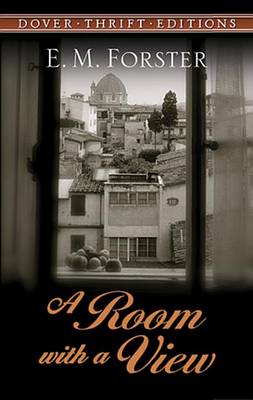
brokentune
‘Bless us! Bless us and save us! We’ve lost the way.’
Certainly they had seemed a long time in reaching Santa Croce, the tower of which had been plainly visible from the landing window. But Miss Lavish had said so much about knowing her Florence by heart, that Lucy had followed her with no misgivings.
‘Lost! Lost! My dear Miss Lucy, during our political diatribes we have taken a wrong turning. How those horrid Conservatives would jeer at us! What are we to do? Two lone females in an unknown town. Now, this is what I call an adventure.’
Lucy, who wanted to see Santa Croce, suggested, as a possible solution, that they should ask the way there.
‘Oh, but that is the word of a craven! And no, you are not, not, not to look at your Baedeker. Give it to me; I shan’t let you carry it. We will simply drift.’
Drifting is a huge theme in this book. At least, from where I'm reading, or rather re-reading it.
Our main character, Lucy Honeychurch, is a young woman on the cusp of emancipation, who travels with her older cousin as a chaperone.
It is in opening chapter in Italy, that the ladies are offered a room with a view by a father and son duo. As it turns out, the father and son, the Emersons, will offer up a number of views to Lucy and her circle throughout the novel, few of which are met with enthusiasm by the Edwardian mores.
Nevertheless, my take on Forster's aim here is to portray that break in generations and that break in thinking from the old and established to the progressive. He does this with great subtlety in the form of Lucy, who first looses her guide book and has to find her way through a foreign city, and later has to make a choice to either pick a path that has been set out for her by her family and the unbearable Cecil, who is best described in these lines:
‘Come this way immediately,’ commanded Cecil, who always felt that he must lead women, though he knew not whither, and protect them, though he knew not against what.
Or to make her own path with the young George Emerson, who has his own ideas but has no illusions about life being uncertain.
I really like Forster's writing in this book but it is still a far cry from the excellent - and much more forthright - Howards End, which followed two years after this one.
The subtlety in his writing is delightful in parts, but I find it hard in this book to sustain the same enthusiasm as I have for the much more twisted Howards End.
Of course it is unfair of me to judge this book by comparison, but there are parts of A Room with a View that are, while lovely, quite boring.
And yet, I loved the re-read of this for being able to notice again how progressive Forster was. This book was written in 1908 and Forster dares to ask questions, not just about class, and national identity, but there is also a discussion of feminism. Of course, the suffrage movements (both suffragists and suffragettes) had been in full swing at the time of writing, but I am rather impressed at how clearly Forster illustrated some of the salient questions that are still causing debate today:
It was unladylike. Why? Why were most big things unladylike? Charlotte had once explained to her why. It was not that ladies were inferior to men; it was that they were different. Their mission was to inspire others to achievement rather than to achieve themselves. Indirectly, by means of tact and a spotless name, a lady could accomplish much. But if she rushed into the fray herself she would be first censured, then despised, and finally ignored. Poems had been written to illustrate this point.
And I am still more impressed that Forster made a choice to support the emerging demand for women (and other groups as we'll see in his subsequent books) to be heard:
Next, I meet you together, and find him protecting and teaching you and your mother to be shocked, when it was for you to settle whether you were shocked or no. Cecil all over again. He daren’t let a woman decide. He’s the type who’s kept Europe back for a thousand years. Every moment of his life he’s forming you, telling you what’s charming or amusing or ladylike, telling you what a man thinks womanly; and you, you of all women, listen to his voice instead of to your own.
